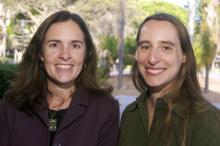Depict
DEPICT: Developing Elementary (Learning) Progressions to Integrate Computational Thinking
Diana Franklin, Danielle Harlow
Computing has infiltrated almost all corners of life and is an increasingly important part of driving innovation, and the next generation of inventors need to understand how to develop and use software. The ability to analyze and express problems in a way compatible with software solutions, or computational thinking, will become critical in modern society. This work has the potential to revolutionize how computer science is taught in elementary schools by showing how these computational thinking skills can be developed in three or six years while supporting education in the existing curriculum. In addition, the resulting curricular materials will be developed with diverse students as the targets. First, the project staff will explore the prior knowledge that students with different backgrounds have, leading to everyday examples that are more accessible and meaningful to diverse students. Second, the content delivery will use the latest research in teaching diverse students computer science concepts.
The University of California, Santa Barbara proposes to discover low anchor points and develop learning progressions for computational thinking and related computer science concepts. These learning progressions are a necessary step towards the integration of computational thinking and computer science concepts into K-12. The project staff will focus on grades 4-6. The curricula and learning progressions will iteratively inform one another. Further, the curricula will be a proof of concept that students can develop computational thinking skills in a way that reinforces other academic subjects and their own culture, and provide a practical way for teachers to begin teaching computer science at different entry points within grades 2-6.
Current status:
We published some of our findings on lower anchor points in SIGCSE 2014. We have also developed and pilot-tested a 4th grade curriculum in over 10 classrooms. This summer, we are revising the curriculum and development environment based on what we learned last year. In addition, we are developing the pilot 5th grade curriculum.
You can read more about the curriculum here.
This material is based upon work supported by the National Science Foundation under Grant No. CNS-0940491 and CNS-1240985.
Any opinions, findings, and conclusions or recommendations expressed in this material are those of the author(s) and do not necessarily reflect the views of the National Science Foundation.
Links
 Diana Franklin,
Danielle Harlow
received an NSF grant to study how 4-6 graders learn
computational thinking through a new curriculum...
more
Diana Franklin,
Danielle Harlow
received an NSF grant to study how 4-6 graders learn
computational thinking through a new curriculum...
more
People
Faculty
Students
Hilary Dwyer - Education
Charlotte Hill - CS
Stacey Carpenter - Education
Ashley Iveland - Education
Publications
Hilary Dwyer, Charlotte Hill, Stacey Patterson, Danielle Harlow, and Diana Franklin, "Identifying Elementary Students' Pre-Instructional Ability to Develop Algorithms and Step-by-Step Instructions," SIGCSE 2014.
Hilary Dwyer, Bryce Boe, Charlotte Hill, Diana Franklin, and Danielle Harlow, "Computational Thinking for Physics: Programming Models of Physics Phenomenon in Elementary School," Physics Education Research Conference, PERC 2013.